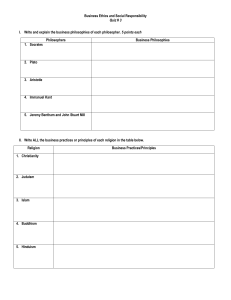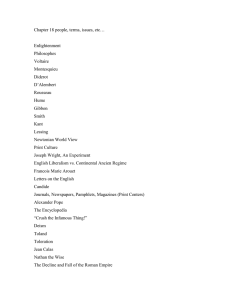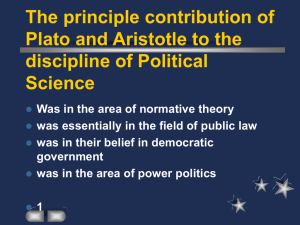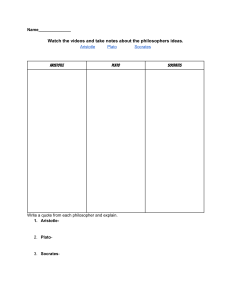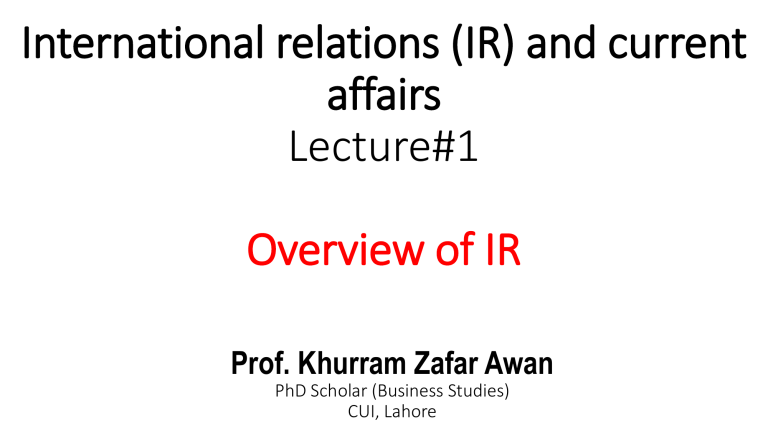
International relations (IR) and current affairs Lecture#1 Overview of IR Prof. Khurram Zafar Awan PhD Scholar (Business Studies) CUI, Lahore What is International Relations International relations, as a subfield of political science, is the study of the interactions among the various actors that participate in international politics. • State Actors: The Government / State • Non State actors: IGOs, NGOs, MNCs, Criminals, Terrorists, IR is the study of the behaviors of these actors as they participate individually and together in international political processes. What is International Relations IR is the study of relationship among countries, the role of sovereign states (political bodies which are not controlled by outside forces), inter-governmental organizations (IGO), International non-governmental organizations (INGO), and Multinational companies. Types of International Relations Political IR: States, IGOs, and NGOs, terrorism, Economic IR: MNCs (financial services, remittances etc.) Social/Cultural IR: Migration, Tourism, professional organizations, Human rights, religion etc. THINKING THEORETICALLY International relations is to study the political sciences, So, political scientists develop theories or frameworks both to understand the causes of events that occur in international relations every day and to answer the foundational questions in the field. THINKING THEORETICALLY There are following many contending theories in international relations, some take similar perspectives while others differ in significant ways. 1. Realism 2. Liberalism/Idealism 3. Marxism 4. Constructionism Mozi (470-391 BCE) Niccolò Machiavelli John Locke Immanuel Kant Marxism Marxism is a social, political, and economic philosophy named after the 19th-century German philosopher and economist Karl Marx. His work examines the historical effects of capitalism on labor, productivity, and economic development, and argues that a worker revolution is needed to replace capitalism with a communist system. Marxism posits that the struggle between social classes— specifically between the bourgeoisie, or capitalists, and the proletariat, or workers—defines economic relations in a capitalist economy and will lead inevitably to a communist revolution. Marxism • Marxism is an economic and political theory that examines the flaws inherent in capitalism and seeks to identify an alternative, which he called "socialism." • Marxist theories were influential in the development of socialism, which requires shared ownership by workers of the means of production. • Communism outright rejects the concept of private ownership, mandating that "the people," in fact the government, collectively own and control the production and distribution of all goods and services. Capitalism Socialism History toward IR Inquiry in international relations often begins with history. Without any historical background, many of today’s key issues are incomprehensible. Arabs- Israel Conflict (6 days war 5th June 1967-10th June 1967) • Iraq, Jordan, Lebanon, Egypt, and Syria attacked on Israel but Israel defeated them Sudan Civil War (1956- present) • West Sudan (Arab Muslim) and South Sudan (Christian) divided in 2010 • Muslim north and Christian/animist south and the Darfur crisis beginning in 2003 • Currently, Darfur Genocide problems facing due to demanded to History toward IR Athens and Sparta War (431-403 B.C.E) • The Peloponnesian War • Sparta defeated Athens while Athens had strong Naval force than Sparta USA attacked Iraq (2003-2011) • Remove Saddam Hussain’s ideas (basic interest) after 9/11 attacked • Arouse Shia and Sunni civil war and USA left Iraq in 2011 USA attacked on Vietnam 1965-1973 • North Vietnam (communism/China), South Vietnam (France) History toward IR Realists might draw the lesson from both Vietnam and Iraq that the United States did not use all of its military might— political actors constrained military actions— otherwise, the outcome may have been different. Liberals might conclude that the United States should never have been involved since the homeland was not directly affected and one country’s ability to construct or reconstruct another state should be IR Philosophies: Plato Philosophy can help us answer questions in international relations. Much classical philosophy focuses on the state and its leaders— the basic building blocks of international relations— as well as on methods of analysis. Plato (c. 427–347 bce), in The Republic The ancient Greek philosopher Plato (c. 427–347 bce), in The Republic, concluded that in the “perfect state,” the people who should govern are those who are superior in the ways. He argued that the life force in man is intelligent. Only a few people can have insight into what is good; society should submit to the authority of these philosopher-kings. Many of these ideas are developed in The Republic. IR Philosophies: Plato Introduction: Political thoughts of Plato Theory of justice, State as body, The Philosopher King, Plato’s Communism: On state, on marriage, and on education, many restrictions on king (restrict control system) Concept of Republic: Base of justice (establish exemplary justice system) Division of Society: Philosopher, Forces, and working persons Theory of education: male and female have equal opportunities, Division of education Level1: 6 year (telling stories) Level 2 6-18 years (mental, physical and music) Level 3: 18-20 years (Philosophy, physical and mental) IR Philosophies: Aristotle Aristotle (c. 384–322 bce), The philosopher Aristotle (384–322 bce), lay both in substance (the search for an ideal domestic political system) and in method. Analyzing 168 constitutions, Aristotle looked at the similarities and differences among states, becoming the first writer to use the comparative method of analysis. He concluded that states rise and fall largely because of internal factors. Views on State: Human is social animal (Human can not live alone), evolution of state (individual-familyvillage-city…..and finally establish and manage the state IR Philosophies: Aristotle State progress: It depends on moral values and political institutions i.e. Pakistani politics want to survive themselves than interest of country’s development. State as Body Disagree with Plato’s communism (people have no fully control on state, education and king etc) Plural state of people’s state (only have rights to choose/elect persons for establishment of state) Thoughts of slavery: There should develop a slavery department manage them because people needs to get slaves for working with them State official: middle class should be included in the state of body IR Philosophies: Aristotle Aristotle’s Political thoughts He wrote a book on Politics- 8 volumes after empirically studied the 168 constitutions of different states in which analyzed the differences and similarities of social laws and customs of those states. Thoughts of Justice should equal for all human. Morality (Moral values for building the societies) Distributive (State laws) and Corrective (trading laws) laws Educational Thoughts:13 years (telling stories), 13-21 years (learning formally different subjects), and after 21 onward years (studying the philosophies) IR Philosophies: Thomas Hobbes Thomas Hobbes (1588–1679) In Leviathan He described life in a state of nature as solitary, selfish, and brutish. Individuals and society can escape from the state of nature through a unitary state. State of Nature: (human is selfish person from the initial stage) Introduction: Graduation from Oxford in 15 years of his age. Study politics and travel Europe and wrote famous book “Leviathan” (sea monster). Monarchy (one state control) is the best. Human nature is selfish because people are living in the forests and caves. State of nature (human was disputing with each other for getting IR Philosophies: Thomas Hobbes Establishing law of nature for living peacefully Origin of state for controlling humans’ selfishness and living peacefully and signed the socially contract. One state will sign the contract (specific written statements of laws) with people. State has supreme power to enforcedly implementation on the laws by people of societies. Otherwise state will punish if they hurt each other. Sovereignty: Absolute power has only one state which use laws for controlling the unethical movements of people. People are willingly agreed with the state to follow the laws. IR Philosophies: Thomas Hobbes Political Thoughts Life: poor, hard, brutish due to the selfishness nature of human. Because people want to protect themselves and only their family members, so, people are selfish. Social contract; State vs people, i.e. Long live the king-Iran (when the king died, people have lot of freedom for three days) Hence, State establishes the laws by the mutually agreement with the people and force them to follow those contracted laws. Only this way state can control and protect the people from unethical brutish people. State force the people to live peacefully by implementation on contracted laws otherwise state will punish them who violate the laws. IR Philosophies: Jean- Jacques Rousseau Jean- Jacques Rousseau (1712–78) In Discourse on the Origin and Foundations of Inequality among Men In his book, Discourse on the Origin and Foundations of Inequality among Men, Rousseau described the state of nature as an egocentric world, with man’s primary concern being self- preservation— not unlike Hobbes’s description of the state of nature. Example: Rousseau posed the dilemma from the story of the hunting stag (common good and interest) and the hare (self interest). • Rousseau drew an analogy between these hunters and states. Do states follow short- term self- interest, like the hunter who follows the hare? Or do they recognize the benefits of a common interest? Rousseau’s preference was for the creation of smaller communities in which the “general will” could be attained. Indeed, according to Rousseau, it is “only the general will,” not a leviathan, that can “direct the forces of the state according to the purpose for which it was instituted, which is the common good. IR Philosophies: Jean- Jacques Rousseau In Rousseau’s vision, “each of us places his person and all his power in common under the supreme direction of the general will; and as one we receive each member as an indivisible part of the whole. He described the state of nature in both national and international society. Argued that the solution to the “state of nature is the social contract”, whereby individuals gather in small communities where the “general will” is realized. State of Nature (Human were spending happy life because individual do effort toward common interest “general will” of belonging society). IR Philosophies: Immanuel Kant (1724–1804) Immanuel Kant (1724–1804), in both Idea for a Universal History and Perpetual Peace. Kant envisioned a federation of states as a means to achieve peace, a world order in which man is able to live without fear of war. Kant’s analysis was based on a vision of human beings that was different from that of either Rousseau or Hobbes. In his view, though man is admittedly selfish, he can learn new ways of cosmopolitanism and universalism. Cosmopolitanism (the belief that all people are entitled to equal respect and consideration, no matter what their citizenship status or other affiliations happen to be), and, IR Philosophies: Immanuel Kant (1724–1804) Immanuel Kant (1724–1804), in both Idea for a Universal History and Perpetual Peace. Sovereignties would remain intact (internal), but the new federal order would be both preferable to a “ super- leviathan” and more effective and realistic than Rousseau’s small communities. Associated with the idealist or utopian school of thought. In Idea for a Universal History and Perpetual Peace (Continuing forever or indefinitely peace), advocated a world federation of republics bound by the rule of law. The Scientific Method: Behavioralism Behavioralism proposes that individuals, both alone and in groups, act in patterned ways (customary ways of behavior). The task of the behavioral scientist is to suggest plausible hypotheses regarding those patterned actions and to systematically and empirically test those hypotheses. Using the tools of the scientific method to describe and explain human behavior, these scholars hope to predict future behavior. Many will be satisfied, however, with being able to explain patterns, because prediction in the social sciences remains an uncertain enterprise. The Correlates of War project permits us to see the application of behavioralism. The Scientific Method: Behavioralism Beginning in 1963 at the University of Michigan, the political scientists David Singer and Melvin Small investigated one of the fundamental questions in international relations: Why is there war? Motivated by the normative philosophical concern with how peace can be achieved, the two scholars chose an empirical methodological approach. Rather than focusing on one “big” war that changed the tide of history, as Thucydides (Athens vs Sparta war) did, they sought to find patterns among a number of different wars. Believing that generalizable patterns may be found across all wars. While, Singer and Small turned to statistical data to discover the patterns. Lecture Summary What is IR? Thinking theoretically Realism theory Liberalism theory Marxism theory Constructivism theory History of Wars Arab Vs Israel Sudan civil war Vs Darfur Athens Vs Sparta USA Vs Iraq and Vietnam Philosophies Plato - Philosopher establish state (Philosopher King) Aristotle – State govern by community Hobbes - Social contract b/w people and State and state control them Rousseau - State of Nature is socially contracted individual focused on “general will” Kant- State should ensure the Perpetual peace (indefinite time peace)cosmopolitanism (equal respect) and Universalism (universal truth and ideas) Scientific method: behavioralism
